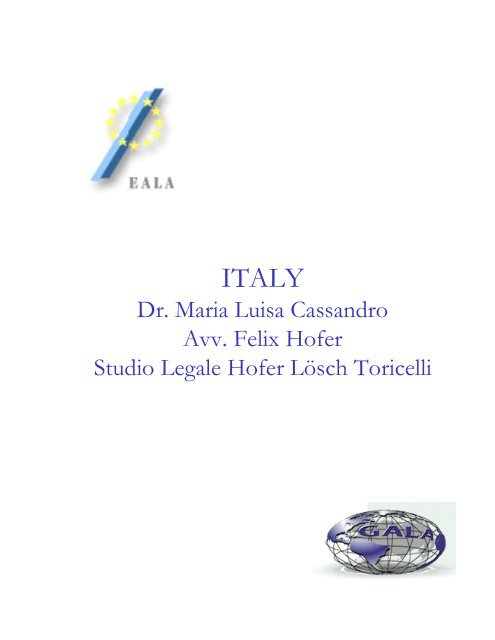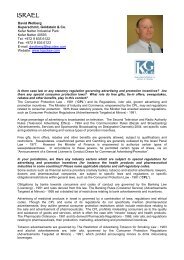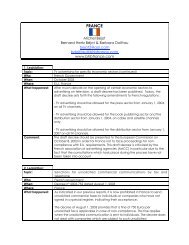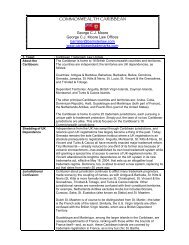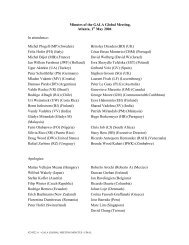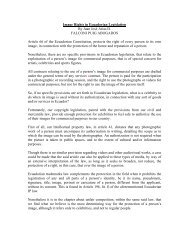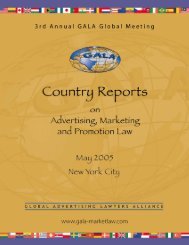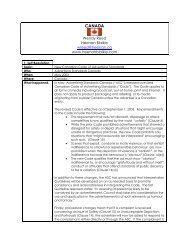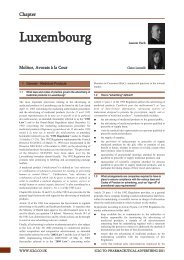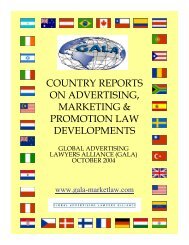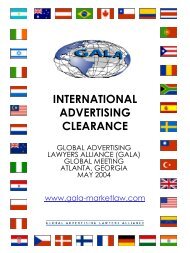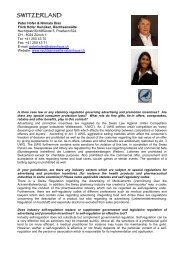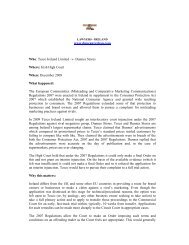Dr. Maria Luisa Cassandro Avv. Felix Hofer Studio Legale ... - GALA
Dr. Maria Luisa Cassandro Avv. Felix Hofer Studio Legale ... - GALA
Dr. Maria Luisa Cassandro Avv. Felix Hofer Studio Legale ... - GALA
You also want an ePaper? Increase the reach of your titles
YUMPU automatically turns print PDFs into web optimized ePapers that Google loves.
ITALY<br />
<strong>Dr</strong>. <strong>Maria</strong> <strong>Luisa</strong> <strong>Cassandro</strong><br />
<strong>Avv</strong>. <strong>Felix</strong> <strong>Hofer</strong><br />
<strong>Studio</strong> <strong>Legale</strong> <strong>Hofer</strong> Lösch Toricelli
Country Report<br />
ITALY<br />
October 2002<br />
<strong>Dr</strong>. <strong>Maria</strong> L. <strong>Cassandro</strong>, <strong>Avv</strong>. <strong>Felix</strong> <strong>Hofer</strong><br />
<strong>Studio</strong> <strong>Legale</strong> <strong>Hofer</strong> Lösch Torricelli<br />
www.hltlaw.it<br />
1. Case Report: Jury of Advertising Self - Regulation - Case n° 133/2002<br />
Topic: Decency in Advertising<br />
Where: Istituto di Autodisciplina Pubblicitaria - IAP (Institute for Self-Regulation in<br />
Advertising), Milan<br />
When: May 21, 2002<br />
What happened: A famous Italian fashion company promoted its new clothing collection, on<br />
magazines and newspapers, through five different ads: the first showed a girl<br />
lying down with her left hand slipped among her legs at the pubis height; the<br />
second one showed a boy with his forefinger and middle finger joint before his<br />
mouth and his tongue slipped among fingers and outstretched towards the<br />
reader; the third showed a model seated with his legs wide apart, wearing only a<br />
pair of underpants and keeping one hand on his pubis, with a banana coming<br />
out from the underpants; the fourth showed a young girl wearing transparent<br />
underwear with her breast uncovered; the last showed the feet of a woman on<br />
the bare back of a man: the sandal’s high heels were sinking into the man’s skin.<br />
The whole campaign has been claimed before the Jury of the IAP as infringing<br />
the Self-Regulation Code, articles 1 (Fairness in advertising), 9 (Violence,<br />
Vulgarity, Indecency), 10 (Religious, moral beliefs and human person’s dignity)<br />
and 11 (children’s and teenager’s protection).<br />
The Jury admitted the action and found that the ads were exclusively aimed to<br />
catch the consumer’s attention. Therefore it considered them as not complying<br />
with the Code’s rules directed to grant protection of absolute and diffused<br />
values. In the Jury’s view the images were so greatly vulgar and exceeding any<br />
limit of decency and good taste that, evidently, they had not any functional link
with the purpose of presenting good qualities and features of the promoted<br />
trademark. Furthermore, the ads made an uncalled-for use of woman’s body and<br />
sensuality, infringing human person’s dignity. In addition, since its great<br />
diffusion, even minors, particularly sensible in their emotional and psychological<br />
sphere, could have been reached by the ads.<br />
On these grounds the Jury, declared that the campaign was clearly infringing the<br />
prescriptions provided by the Self-Regulation Code, through an unacceptable<br />
pornographic content. Therefore, the Jury ordered magazines’ editors (signers<br />
of the Code, and therefore compelled to respect its rules), to stop any further<br />
diffusion of the claimed messages and inflicted the additional sanction of the<br />
publication of an abstract of said verdict on their magazines.<br />
Comment: It has to be considered that this campaign has been diffused in other European<br />
Countries provoking the same polemical reaction of the public. The actions filed<br />
before the local self-regulation board have been admitted and defined with<br />
similar verdicts. Consequently, said campaign has become the object of an<br />
advertising claim at European level and therefore managed by the European<br />
Alliance for Advertising Standard (EASA), as the maximum authority of Self<br />
Advertising Regulation competent for cross border complaints.<br />
2. Case Report: Jury of Advertising Self - Regulation - Case n° 134/2002<br />
Topic: Moral and Religious beliefs protection in Advertising: “No irony about death”<br />
Where: Istituto di Autodisciplina Pubblicitaria - IAP (Institute for Self-Regulation in<br />
Advertising), Milan<br />
When: May 21, 2002<br />
What happened: A worldwide famous computer company aired an advertising campaign on TV<br />
aimed to promote its new video game. The ad was set in a delivery room where a<br />
woman is giving birth to a child. The new born baby beginning a parabolic<br />
flying, grows up first into a little boy, then into a teenager, into an adult and<br />
finally into an old man when he finishes his “journey” crashing into a grave. A<br />
piercing cry makes the sound background during the quick flight slipping<br />
through the life’s seasons, while the message reads: “Life is short. Play more”.<br />
The ad has been claimed before the Jury of Advertising Self-Regulation as<br />
infringing the Code, article 9 (Violence, Vulgarity Indecency), article 10 (Moral,<br />
civil, religious beliefs and protection of human dignity), article 11 (Protection of<br />
minors and teenagers).<br />
The Jury stated that the images combined with the sound and the message were
able to deeply debase a subject as serious as birth and death. In fact, the Jury<br />
argued that the company through the ad would uphold that said subjects have<br />
been used as events comparable for the quickness in their developing to the<br />
advertised video game.<br />
Therefore the Jury declared that the claimed ad was not in compliance with the<br />
Code. Since the company, during this ascertaining procedure had already<br />
spontaneously interrupted the campaign undertaking to desist from any further<br />
improper use, the Jury has not applied the additional sanction of publishing said<br />
verdict.<br />
Comment: Providing its verdict, the Jury confirmed its view, already expressed in previous<br />
decisions, that birth and death are events that cannot be used in advertisement<br />
messages or for commercial purposes without taking into account the deep<br />
meaning that, according to individual moral and religious beliefs, they generally<br />
assume to people.<br />
3. Case Report: Jury of Advertising Self – Regulation - Case n° 151/2002<br />
Topic: Protection of minors in Advertising<br />
Where: Istituto di Autodisciplina Pubblicitaria - IAP (Institute for Self-Regulation in<br />
Advertising), Milan<br />
When: June 4, 2002<br />
What happened: A famous Italian motor company aired a TV ad in order to promote its last car<br />
model. The spot was set in a shed where four men were inquiring a young man<br />
forced on a chair in order to get information on the car model that he let run<br />
away by menacing and torturing him.<br />
The ad has been claimed before the Jury of Advertising Self- Regulation as<br />
infringing the Code, article 11 (Protection of minors). The Jury stated that the<br />
violence diffused through the advertisement, if sawn by minors, could be able to<br />
influence their mind and behaviour and to induce them to imitate such negative<br />
attitude.<br />
Therefore the Jury declared that the claimed ad was not in compliance with the<br />
Code and prohibited the motor company from running the ad before 22:30 p.m.,<br />
when children, presumably, should not be watching television.<br />
Comment: It has to be noticed that through said decision the Jury has operated a balanced<br />
application of the Code of Advertisement Self- Regulation, settling the opposing<br />
interests of parties involved. In fact, the Jury has taken into account: the
advertiser’s interest, whose freedom and creativity on communication has to be<br />
properly considered, as well as the protection to be reserved to minors, whose<br />
balanced psychological growth must be granted. On these grounds, the Jury, in<br />
compliance with precedent decisions on the same matter, has delivered a<br />
solution that, even if not specifically provided by the Code, appeared adequate<br />
for reconciling opposite interests.<br />
4. Case Report: Authority for Market and Competition - Case n° 10784/2002<br />
Topic: Misleading Advertising: Fitness from a Hobby to a Job.<br />
Where: Italy – Rome<br />
When: May 23, 2002<br />
What happened: The Italian Aerobic and Fitness Federation (A) has required action from the<br />
Authority for Market and Competition claiming the advertising message diffused<br />
on Internet by a sports federation (B) for promoting its activities. The claimant,<br />
in particular, pointed out that the message was misleading with respect to those<br />
statements affirming that the certificate (diploma) issued by B was the only title<br />
to qualify as a trainer, according to the regional laws in force. Furthermore, he<br />
pointed out that the inclusion of fitness within sports supervised and regulated<br />
by the CONI (National Olympic Committee: the body competent to manage<br />
and control the national sporting activities) was totally misleading.<br />
The Authority invited parties to provide information and documents referring to<br />
the raised questions, in particular with respect to the national and local<br />
regulation in force concerning the conditions required to qualify as a trainer.<br />
Furthermore, since the ad had been diffused through the Internet, the Authority<br />
asked for an opinion of the Communications Commissioner.<br />
The comments provided by the federations gave evidence to the fact that the<br />
claimed statements were untrue. In fact, the “diploma” attainable through the<br />
promoted course was not the only way for obtaining the trainer qualification.<br />
Actually, up till now no Region has provided rules specifically aimed to regulate<br />
the particular matter. Therefore, no harmonized regulation, concerning trainer’s<br />
qualification, is available and in force. As to the term “fitness”, it has been<br />
assessed that it is commonly used with a generic meaning, i.e. a reference to all<br />
those activities directed to maintain or improve a person’s psychophysical form.<br />
Therefore, fitness cannot be identified with sporting activities falling under the<br />
CONI’s supervision.<br />
On these grounds, the Authority stated that the claimed message was misleading
with respect to both of the raised issues. On one side, the message was<br />
misleading since it was able to erroneously convince consumers that according<br />
to regional laws a trainer’s activity necessarily required the diploma following the<br />
promoted course. On the other side, it made the consumer believe that fitness<br />
has to be considered a sporting discipline and therefore its practice, as well as its<br />
teaching are strictly regulated even by the Statute of B.<br />
Consequently, the Authority declared that said misleading outcomes are likely to<br />
prejudice consumer’s economic attitude as well as to damage competing<br />
companies and ordered B to stop any further diffusion of the ad.<br />
Comment: It appears interesting to notice that control of misleading advertising diffused<br />
through the Internet requires no new special regulation, but can be granted by<br />
involving existing Authorities: the Authority for Market and Competition and<br />
the Communications Commissioner.<br />
5. Topic: Protection from Deceptive Advertising: 10 Golden Rules<br />
Who: Authority for Market and Competition<br />
When: July 2002<br />
What Happened: In order to offer consumers specific guidelines for protection from misleading<br />
deceptive ads the Authority for Market and Competition has recently issued a<br />
Decalogue, posted on its web site: www.agcm.com.<br />
This “vademecum” provides consumers with guidelines aimed to control the<br />
fairness of advertising messages, to promote the Authority’s checks and to file<br />
claiming actions.<br />
Said rules may be summarized as follows:<br />
1) Look at the message: the full text, small printed characters included,<br />
must be carefully read and checked, since relevant information could be<br />
marginally provided,<br />
2) Is it the right price? It has always to be checked if the indicated price is<br />
including additional costs (i.e. VAT, shipping taxes, delivery charges, telephone<br />
unit costs),<br />
3) Mission impossible: pay attention to messages promising miraculous<br />
results (this commonly occurs with respect to slimming products or cosmetics),<br />
4) Think it over before signing: no standard form should be signed before<br />
reading all provided conditions since in some cases the offers may hide a real
contract,<br />
5) The claim is not enough: in order to ascertain the offer’s advantage it is<br />
advisable to examine the full message assuming all information concerning terms<br />
and conditions of the promotion (discount, sale, number of items available,<br />
rates),<br />
6) Distinguish the heart from the billfold: services supplied by wizards, and<br />
fortune-tellers may be very expensive. Furthermore, it does not exist any method<br />
able to make more likely to gain with drawing games,<br />
7) How much does it cost? Check financing conditions offered for<br />
purchasing and for personal loans and mortgage loans (interest rates, period of<br />
validity),<br />
8) It could be only a fiction: in certain contexts, a hidden advertising may<br />
be concealed in an apparent informative or entertainment nature (i.e. press, TV<br />
programs),<br />
9) Pay attention to dangers: the advertising is required to warn consumers<br />
with respect to the eventual dangerous nature of the product. Thus, it is<br />
necessary to read warnings provided with the advertising message or into the<br />
product’s packaging,<br />
10) Protection of minors: advertising must necessarily respect a minor’s<br />
physical and psychological protection. Some advertisements, even though not<br />
misleading for adults, may induce minors and teenagers to a dangerous realistic<br />
misrepresentation.<br />
Comment: Consumer protection is developing more and more, especially with respect to<br />
the risk of misleading advertisements, whatever mean of communication may be<br />
used. As to this purpose, it has to be considered that Italy has been the first<br />
country member of the EU to promote (on the April 10 th , 2002), in compliance<br />
with EU Directives n° 95/46 and n° 97/66, the adoption of conduct’s and<br />
professional practice’s codes.<br />
Furthermore, the Authority has recently introduced the adoption of temporary<br />
measures suspending the diffusion of a claimed advertisement. This in order to<br />
counteract the potential negative outcomes of a purported misleading<br />
advertising when, pending the procedure, the decision has not yet been enacted.<br />
This innovative and more efficient form of consumer protection appears<br />
particularly efficient for ads diffused through the Internet, where the potential<br />
misleading effects are likely to hit a consistent number of consumers.
6. Case Report: Data Protection Commissioner<br />
Topic: Spamming: Data Protection on-line.<br />
Where: Italy<br />
When: June 24, 2002<br />
What Happened: A University Professor received an e-mail ad targeted to his e-mail address<br />
available on the University’s web site. The Professor complained with the Data<br />
Protection Commissioner claiming that the advertiser made an improper use of<br />
his personal data listed on the University’s web site only for institutional, but not<br />
for commercial purposes. He also asked for the payment of the administrative<br />
procedure’s costs.<br />
The company declared that, following said complaint, it had included the<br />
professor’s name into a specific directory provided for those subjects contrary to<br />
receive advertising. Furthermore, the company stated that the e-mail address was<br />
available on the University’s web site and, for that reason, had to be considered<br />
as publicly available.<br />
On these grounds, the Data Protection Commissioner stated that the possibility<br />
of accessing an e-mail address listed on a web site could not automatically lead to<br />
consider it as a data available to the public. On the contrary, the specific purpose<br />
pursued through publication of certain personal data on the Internet becomes<br />
relevant. Therefore, the Commissioner held that in the specific case, the address<br />
diffused for a limited purpose, as the institutional one, could not be freely used<br />
for sending any kind of e-mail, without the data subject’s prior consent. Failing<br />
to request and obtain said consent, the advertiser breached the privacy<br />
regulation. In addition the Commissioner stated that, instead of including the<br />
address in a separate list, the company was strictly compelled to cancel the<br />
professor’s data and refrain from any further use of said data for commercial<br />
communications.<br />
The Guarantee ordered the company to comply with said decision and to pay<br />
the costs for the procedure.<br />
Comment: In compliance with the European guidelines aimed to protect personal data online,<br />
the Italian Data Protection Commissioner has set a clear parameter aimed<br />
to check when a data, even if available on the Internet, may be considered public<br />
and therefore diffused without the subject’s consent.<br />
Therefore, not any form of spamming can be legally performed without data<br />
subject’s specific consent.<br />
In compliance with the above-mentioned decision, the Commissioner has<br />
recently (July 26, 2002) ordered seven companies working on the Internet<br />
(advertising agencies and electronic retailers) to stop any further processing of
personal data included in their databases. The Commissioner found that said<br />
companies, breaching privacy regulation, had improperly processed personal<br />
data for commercial and promotional purposes without obtaining prior consent.


